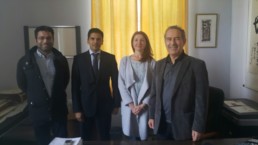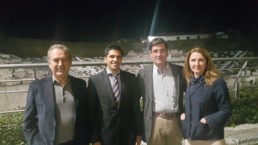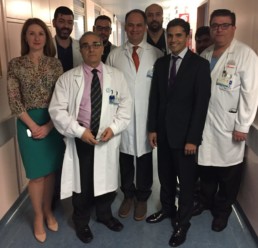Greece 20th November -4th December 2016
Report by Dr Olga Pidgaiska & Mr Sujith Konan
The European hip society has grown in strength over the last few years and as a part of educational developments developments, advertised an excellent educational opportunity; the European Hip Society Travelling fellowship. The candidates chosen for the year 2016 were announced earlier during the year. We (Dr Olga Pidgaiska, Orthopaedic Surgeon from Ukarine and Mr. Sujith Konan, Orthopaedic surgeon from UK) were honored to take part in the first visiting fellowship program. The country of visit chosen was Greece. Three orthopaedic centers were selected for the visit namely Athens, Larissa and Thessaloniki. The fellowship was for a total duration of two weeks.
Following the announcements, we made arrangements at work and to travel to Greece; while the host surgeons made arrangements for local stay and travel within Greece.
The fellowship was split between the three centers depending on the host availability and clinical commitments. The first week was to be spent between Athens and Larissa and the second week at Thessaloniki.
During our first three days in Athens, we had the pleasure of shadowing Prof. George Macheras and his team in the KAT Hospital in Athens. Incidentally, this is the same city where Prof Hartofilakidis worked and published his seminal work on dysplasia. Prof Macheras is a busy surgeon who also spends considerable amount of his time in administrative and leadership activities of EHS & EFORT as well as administration at the KAT hospital in Athens. He has over the years mastered the direct anterior approach using a traction table. We had theatre sessions with Prof. Macheras on 3 days and took turns to scrub for procedures with him. We were filled in on tips and nuances of the direct anterior approach in cases of primary hip arthroplasty. We also witnessed some revision cases with the traditional posterior approach. It was clear from the start that Prof Macheras had streamlined his theatre activities and trained up an excellent group of theatre personnel who brilliantly demonstrated their skills. There was minimal verbal communication between cases; with members of the team easing into the ‘roles’ at various stages of the procedure. The positive attitude and teamwork was a delight to watch. When we were not in theatre we also accompanied Prof Macheras and his team on a ward round, a presentation of departmental research activities, a visit to an upcoming research facility, and some excellent case discussions. During the ward round we observed post-operative patients who were mobilized early after DAA. Prof Macheras is a visiting surgeon in countries outside Greece where he takes on challenging arthroplasty cases and uses his expertise to reconstruct failed and neglected hip and knee cases. We had the opportunity to see some of the radiographs and intra-operative pictures of these cases during our discussions.
While in Athens we experienced the “Greek Hospitality” first hand, and were kindly invited to organized visits of the old city, the Acropolis and some excellent lunch and dinner outings. The fresh tasty food with historic backdrops and some stimulating orthopaedic (and non orthopedic) discussions was a perfect start to the visit.
From Athens we travelled with Prof Macheras to Larissa where Prof. Theofilos Karachalios was our host. Prof Karachalios is an accomplished surgeon, an excellent researcher and above all well read in history, music and politics. He had arranged an excellent flavor of cases he deals with on a regular basis. Greece is known to be part of the ‘European dysplasia belt’ and it was no surprise that the hip replacements were all for high dislocations and neglected dysplasias. We had the opportunity to observe shortening osteotomies at sub trochanteric as well as distal femur levels. Two separate educational events had been planned to coincide with our visit. An evening of presentations by the Orthopaedic Surgeons in Larissa and us fellows saw a fine exchange of research information. A separate two day “suprapath concept” course with lectures and cadaveric demonstrations was also organized. It was clear that a lot of planning and organization had gone into our visits. Once again the evenings were filled with visits to historic locations such as the open theatre and the ancient city as well as dinner discussions over several relevant topics. Our visit to the holy Meteora Monastery was an unparalleled experience and deserves a special mention.
We believe this fellowship has given us a unique opportunity to visit leading surgeons and observe different teams at work. We picked up several surgical, leadership and managerial tips that will stay in our minds forever
Olga Pidgaiska & Sujith Konan, EHS Visiting Fellows 2016
In the second week of the fellowship Prof. Eleftherios Tsiridis in Thessaloniki hosted us. In anticipation of our visit, a schedule had been planned and included clinical activities, visits to historic locations and educational meetings. We spent time in two hospitals, the Papa Georgiou Hospital, the public facility for patients and St Lukes Hospital, an independent facility. We were to observe surgery in both places and the case mix included hip replacements for dysplasia, and complex revisions. We had the opportunity to observe the technique of figure “7- autografting in a case of dysplastic acetabulum; Hartofilakidis method for controlled acetabulum-plasty with medial wall displacement; usage of TM for acetabulum augmentation and impaction grafting. Prof Tsiridis takes great pride in his work and spent time explaining every surgical step; followed by demonstration. His reconstruction of choice was a hybrid system (Exeter stems with uncemented acetabulum) . We were given a tour of the Papa Georgiou hospital highlighting all the latest facilities in diagnostics and treatment that was being used. We also visited Core-Kedek Research center; an impressive industry/ research collaboration with several ongoing research and innovation activities.
Prof. Tsiridis has a strong research background and all of the residents, consultant surgeons are involved in ongoing research activities, papers for presentation, and publication with a number of then even preparing for post-graduate dissertations. During the scientific meeting we shared our experience of our units’ work. It was useful to engage in direct interaction with the researchers and to get acquainted. It was very interesting that young students, surgeons and researchers were presenting alike with the same zest. The last two days of the fellowship included the annual MAST course chaired by Prof Tsiridis. It had national and international speakers providing relevant lectures and surgical demonstrations.
Thessaloniki, located by the sea, was a beautiful location and visits to historic cites, museums in city and the Virginia, were mind-blowing experiences for us.
We believe this fellowship has given us a unique opportunity to visit leading surgeons and observe different teams at work. We picked up several surgical, leadership and managerial tips that will stay in our minds forever. We also hope to establish strong research and educational links with the host centres for future endeavors. We would like to thank European Hip Society for giving us the opportunity to undertake the fellowship, and extend our sincerest gratitude to all the EHS team for making our visit a truly fantastic experience, in particular prof. G. Macheras, prof. T. Karachalios, prof. E.Tsiridis, and Mrs. Samantha Stokes.




